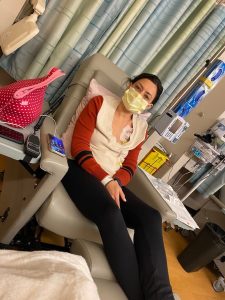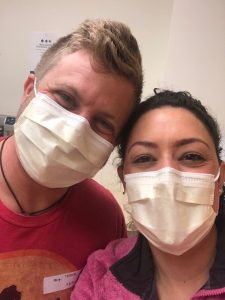CJC Alumna Chronicles Her Battle with Breast Cancer
By Madison Hindo, B.S. Public Relations 2020
Battling a life-threatening illness is challenging in any circumstances, but the COVID-19 pandemic has complicated things further for patients. When Atlanta TV news station CBS46 reporter Melissa Stern, B.S. Telecommunication 2011, was diagnosed with stage two breast cancer, she turned to writing about her experiences to cope.

“I had found a lump in the fall of 2019 myself, and I went and got it checked out,” Stern said. “My gynecologist actually told me he thought it was nothing.”
Though her doctor was not initially worried, he told her she could still get it tested for peace of mind. Despite having no history of breast cancer in her immediate family, she was diagnosed in February, a week after her 31st birthday.
Shortly after her diagnosis, Stern decided that she wanted to document her experience with breast cancer. She pitched a series on her experiences to her boss at CBS46, and the station has been supportive of the project.
“I felt if something positive could come out of all of this, it would be worth it,” Stern said. “I’ve covered breast cancer rallies. I’ve interviewed people for all sorts of things. You think you know and you hear about it, but until you’re going through it, you really don’t understand it on a deep level.”
 The series consists of both video segments that are aired on television and blog entries published online. Stern writes scripts to go with the videos and uses her blog entries to provide more details and information about her experiences.
The series consists of both video segments that are aired on television and blog entries published online. Stern writes scripts to go with the videos and uses her blog entries to provide more details and information about her experiences.
“As a reporter, I know there are a lot of people that don’t want us in their business, especially if it has something to do with a life-threatening illness like cancer,” she said. “I felt like this was a unique opportunity to share my story on a very personal level.”
The first story, “Cancer in Times of COVID: Melissa’s Journey,” was published on April 30, and more stories are being planned. In the first story, she details her experiences starting chemotherapy and the additional challenges posed by COVID-19.
Stern is allowed to bring one guest with her to the hospital, a luxury compared to other hospitals where only the patient is allowed inside, but she is still unable to see her family and friends. They keep in touch through FaceTime calls and phone calls, even though they are not able to be together physically.
“It’s just difficult. People can’t really travel, no one can come visit you,” Stern said. “If I want to go get a massage or get my nails done or do something that makes me feel good, I really don’t have the opportunity to do that even though things are opening back up now.”

Despite the state government taking steps to reopen Georgia, Stern is immunocompromised and stays home other than trips to the hospital. She has learned to adapt to reporting from home rather than out in her community, and her station has had to develop new ways to tell important stories while still taking necessary health precautions.
She plans to keep up with the project through her six rounds of chemotherapy and surgery later on, and she hopes to give people an inside look into what it is like to battle breast cancer.
“We’re just going to follow every step through so everyone knows step-by-step what to expect,” Stern said.
For the first time in her reporting career, Stern is telling her own story rather than the stories of the communities she covers.
“Traditionally, I’m writing about other people and interviewing other people, and this is different because it’s a very personal story,” Stern said. “I’m always taking pictures and videos and showing the awesome aspects of my life. I felt people should really know about what’s going on, and if I can help someone in any way then it’s worth it.”
Though many people are affected by cancer in some way, Stern recognizes that each experience is unique.
“The unknown is the hardest part,” she said. “You don’t know what’s going to happen, and I think it is important to talk to people who have gone through it and get as much information as you possibly can to make going through it at least a little bit smoother.”
Stern hopes that her stories help people diagnosed after her have a better understanding of what might happen to them, and she says that the community response has helped her get through her own treatments.
“I like sharing the stories. It makes me feel better to have people write back and viewers write in and say ‘I went through it too,’” Stern said. “The support and feedback from people has really helped me get through it.”
Posted: May 18, 2020
Category: Alumni Profiles, Profiles


